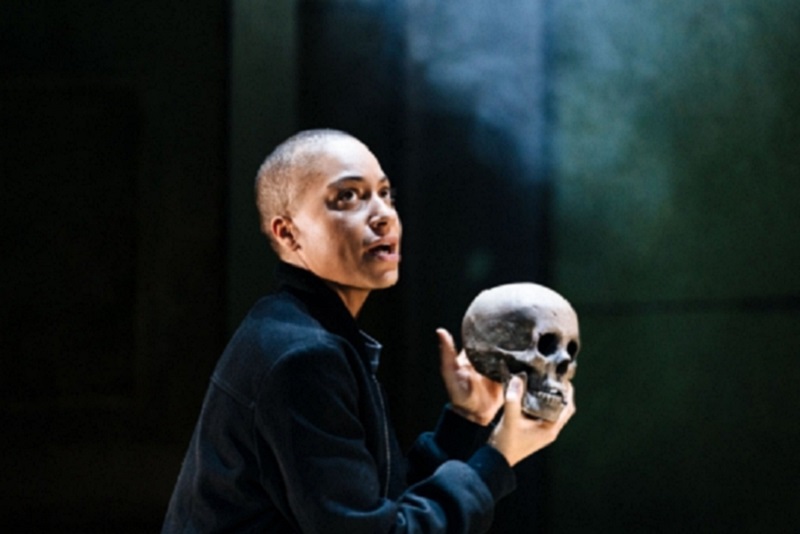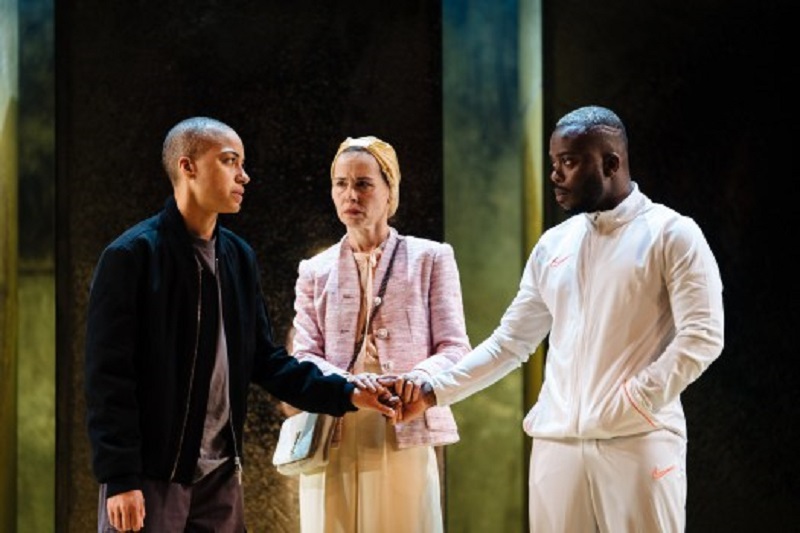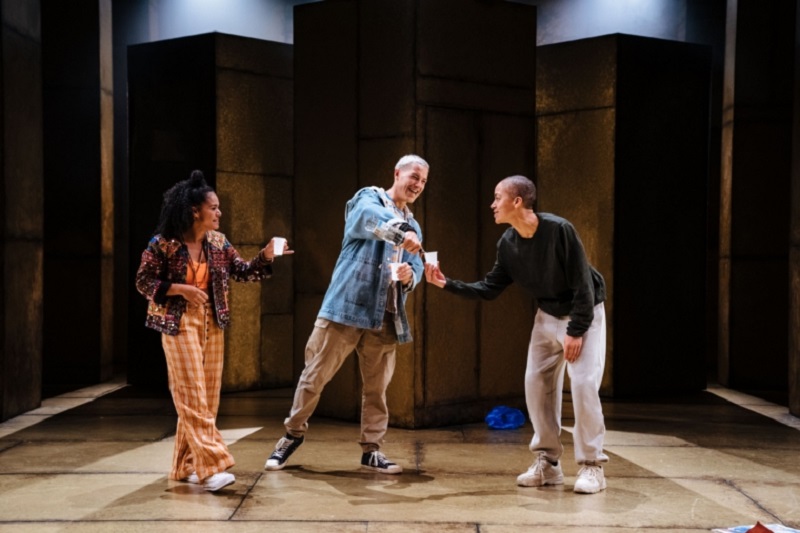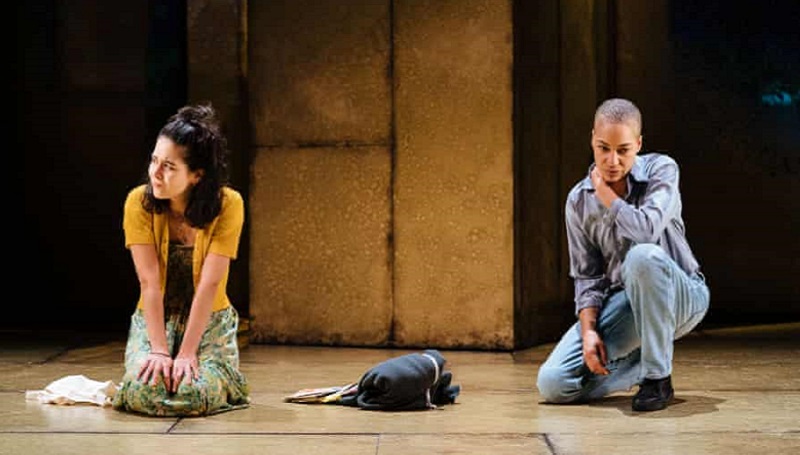“Hamlet”: Young Vic
Jeremy Malies in Waterloo
5 October 2021
The Young Vic’s Hamlet starring Cush Jumbo was one of the hottest tickets in London this autumn. Jumbo is on a wave of popularity from the current CBS legal drama The Good Fight, and the production had been deferred from last year due to the pandemic with everybody retaining their tickets.

Cush Jumbo.
Photo credit: Helen Murray.
When I interviewed Kwame Kwei-Armah, artistic director at the Young Vic, a few issues ago about the upcoming season, I asked what we might expect from this Hamlet. In an otherwise candid conversation, he was evasive. “Here’s what I bought when I bought Cush as Hamlet. I bought Cush saying, ‘I’m going to do it and I’m going to go in and give it all I can in terms of defining the truth of what I think Hamlet is in my body.’ I bought that investigation.” Well, Cush Jumbo has investigated the role with rigour, intelligence, and technical virtuosity. But she has precious little by way of support around her in Greg Hersov’s disappointing production.
Never have I seen anybody open up the part with such skill when portraying their character’s inward debate about suicide and musings on female sexuality which are all the more powerful given the cross-gender casting. Jumbo invests “Rogue and peasant slave” with a lazer-like, almost puritanical search for the truth, and the whole audience pulsates with her as she explores the “What a piece of work is a man!” monologue. Jumbo is often inventive with metre while staying on the overall pulse of the verse.
Jumbo and Norah Lopez Holden (Ophelia) are always credible as a couple, and we are intrigued by what kind of intimacy there has been. A gorgeous, exquisitely performed Spanish dance hints that they are at ease with each other physically and are or have been deeply in love. Lopez is strong when projecting the pouts and moody body language of a teenager absorbed by what is on her Bluetooth headphones. But her mad scene (Hersov gives her no central idea and few props with which to propel the speech) has minimal impact and is a squandered open goal among the many missed opportunities of this production.

Cush Jumbo, Tara Fitzgerald and Jonathan Ajayi.
Photo credit: Helen Murray.
Claudius (Adrian Dunbar) and Gertrude (Tara Fitzgerald) also misfire. They are of course ghastly self-serving characters, but Shakespeare has still lavished attention on them as studies in shallowness. This and many recent productions (I include the version starring Ian McKellen at Windsor) see actors using the superficial smarminess and insincerity as an excuse not to investigate the roles fully and find occasional light and shade.
I understand that Claudius is a calculating spin doctor but I do at least want to believe in his love for Gertrude and their joint ambitions. Dunbar plays both the Claudius and the ghost which is logical since the pair of characters are brothers. He makes a great start as the ghost, initially a disembodied voice and then appearing on stage, and proceeds to nail Claudius’s great reflective opening speech. But he subsequently runs out of inspiration to an extent that the scene in which he conspires with Laertes (an equally inert Jonathan Ajayi) to have Hamlet killed in the duel is turgid and embarrassingly short on ideas from both men.
The portrayal of Gertrude is even less inspired. Fitzgerald is particularly bad in the closet scene where her hysteria is simply turned on like a tap. At no time has she acquired detail to her character gradually or unobtrusively. Her complaint to Hamlet “Thou turn’st mine eyes into my very soul” should be a transforming (possibly redemptive) line but it falls flat. Later, her narration of Ophelia’s drowning, a speech freighted with musicality, proves similarly leaden.
The design by Anna Fleischle is little more than a set of polished metal blocks. It’s a single-tier set when using a pair of tiers seems to be the optimum approach in a modern (and in this case supremely flexible) theatre to reinforce the many rampart, messenger, and letter-reading scenes as well as rendering them fluid. I don’t believe the simplicity of the set clarified anything or made the action and the blocking cleaner.

Joana Borja, Taz Skylar and Cush Jumbo.
Photo credit: Helen Murray.
By contrast, the lighting by Aideen Malone is full of inspired touches. It’s so subtle that we peer upstage with Hamlet as the ghost scurries away while saying that a glow-worm has alerted him that dawn is near. Similarly, in an inspired moment, Malone contrives for Jumbo to catch her own distorted reflection in one of the blocks. She is startled, thinking it is her father’s ghost. There is a fair amount of shared light which gives the audience the impression of a joint effort between them and the actors. And how refreshing! Just for once, a production negotiates all the eavesdropping scenes without littering the set with CCTV cameras.
The verse-speaking is excellent in the opening scenes (exactly what Hamlet asks for in his advice to the players) with Jonathan Livingstone as Horatio impressing with his references to classical Rome. But this is a version that becomes fatigued in every sense, and I heard actors slipping into a potpourri of accents including Estuary English. Joseph Marcell does at least score a few palpable hits with the major speeches as Polonius and gets big laughs as he gives university-bound Laertes a credit card.
Taz Skylar (Rosencrantz) and Joana Borja (Guildenstern) are outstanding and do a lot to lift the evening. A pair of unprincipled hedonists – for once the relish they have for betraying Hamlet is believable – we see them gurn as they take selfies, fill the stage with steam from their vaping machines, and down litres of tequila.
But the general lack of concerted effort or skill around Jumbo makes this a flawed project. Why Leo Wringer as gravedigger should suddenly belt out snatches of Bob Marley is beyond me, but the audience reacted as if Caruso had been resurrected before their eyes.
Ten years ago at the Manchester Royal Exchange, Jumbo won the coveted Ian Charleson Award working with Hersov on As You Like It. I fail to understand why she didn’t insist that he should extract more vitality and close observation from the supporting cast. It comes as a relief that the Fortinbras plot is not included but at three hours 15 minutes this is still long and occasionally gruelling. “’Tis in my memory lock’d”? Fortunately not. I’d be having the bad dreams that Hamlet complains of. Cush Jumbo excels with a mental disintegration that is compelling, but the other plus points are slight. This was a mixed evening and, on the whole, eminently forgettable.









